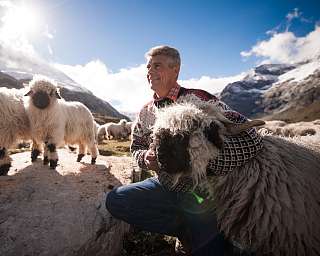Black Nose Sheep
“When the alpine meadows are lush and green in Zermatt, the mountain flowers bloom in intense colors and my sheep graze peacefully in front of snow-capped mountains with their long wool washed white by the summer storms, I’m happy. This is home for me.” Paul Julen‘s eyes sparkle.
Full of enthusiasm, he speaks of his finest moments as a shepherd. And the animals to which he has devoted so much passion are really something special. The spiral horns, long white wool, black spots on the legs and not to forget the black coloring on the head.
Cuddling the sheep: In winter, between mid-December and mid-April, we offer guided visits to the sheepfold on Wednesdays. In July and August they can then be found outdoors on Gornergrat. There are no sheep in the barn in spring, summer and autumn.
Low season May, June, September, October and November:
Between the sheepfold visit in winter (exclusively on Wednesdays between mid-December and mid-April) and the "Meet the sheep" in summer (approx. mid-July to early September), the animals are on holiday and stay in the mountains without a GPS tracker. The hotel receptionists have no information about where the animals are in May, June, September, October and November. Unfortunately, we are also not informed where other shepherds' animals are staying or where else you can visit black-nosed sheep. We ask for your understanding that our barn is closed from mid-April to mid-December and cannot be visited.
The exact dates for Meet the Sheep in summer can be found HERE.
Worldwide largest breeder of blacknose beauties
In 1972 when Paul Julen and his brother bought eight of the traditional Valais black nose sheep, he had no idea that it would change his life.
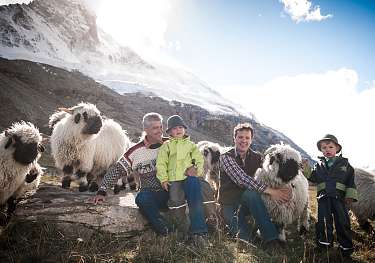
Neither of them had any idea about sheep. Starting together, they had to learn everything from scratch. Today, with 300 animals Paul Julen is the world’s foremost breeder of this sheep type. However, “I’m not only interested in breeding. Through these sheep our guests can learn so much about the culture and life here in the mountains.”
Each year the Julen family cures 100 lambskins, some are used so that the guests have nice soft seats in their restaurants, others are sold as popular holiday souvenirs. They also process the 1,200 kg of wool which the sheep give every year. This is the first year that the wool has been made into warm blankets for guests. “Fortunately, there’s always a black sheep in the herd so we can use our own wool to embroider the ‘Tradition Julen’ logo on the blankets.” said son Paul-Marc. He has also succumbed to the charm of the black noses and enjoys when he can find the time to go visit the animals with his boys Jarno and Rajan.
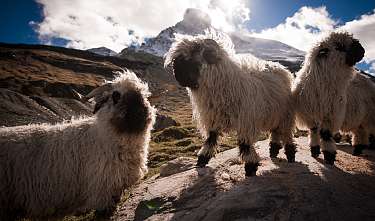
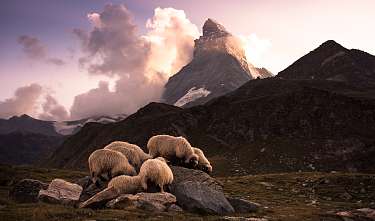

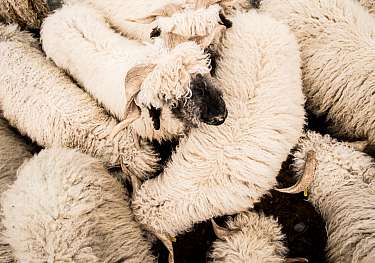
The sheep spend the winter months in a barn on the edge of the village. This provides the opportunity for the Julen family to bring their animals even closer to their guests. Since December 2013 it’s been possible to visit the sheep barn with either Paul or Paul-Marc, who know many interesting facts and stories about the black noses and traditional farming in the area. Guests are then invited to enjoy a good glass of wine with cheese and meat from the Julens’ own production.
The meat of the black-nosed sheep is a special treat and the taste often appeals even to those guests who otherwise do not eat lamb. “This is partly because at this altitude the animals are grazing on the best wild herbs.” says Paul Julen. About 180 lambs and 30 ewes are slaughtered annually. This however cannot meet the needs of their restaurants. The demand for lamb specialties is large and the excellent quality of the meat is famous far beyond the country’s borders. Therefore they also buy additional lambs from other shepherd colleagues.
Even though it’s always hard for Paul Julen to see his animals off on their way to the slaughterhouse – this is also a part of the cycle. And when, during “Lämmli time” every year around 200 young animals are romping around the fields, the circle closes again.
“The fact that I can combine my work as host with the passion for my sheep, is a gift. If I were only working with the animals, I would feel I was missing something. Just as if I would only work among people, I would feel the same.” Good that Paul Julen does not have to choose just one. Because it’s the same the other way around: he would be sorely missed by his sheep, as well as by his guests.
